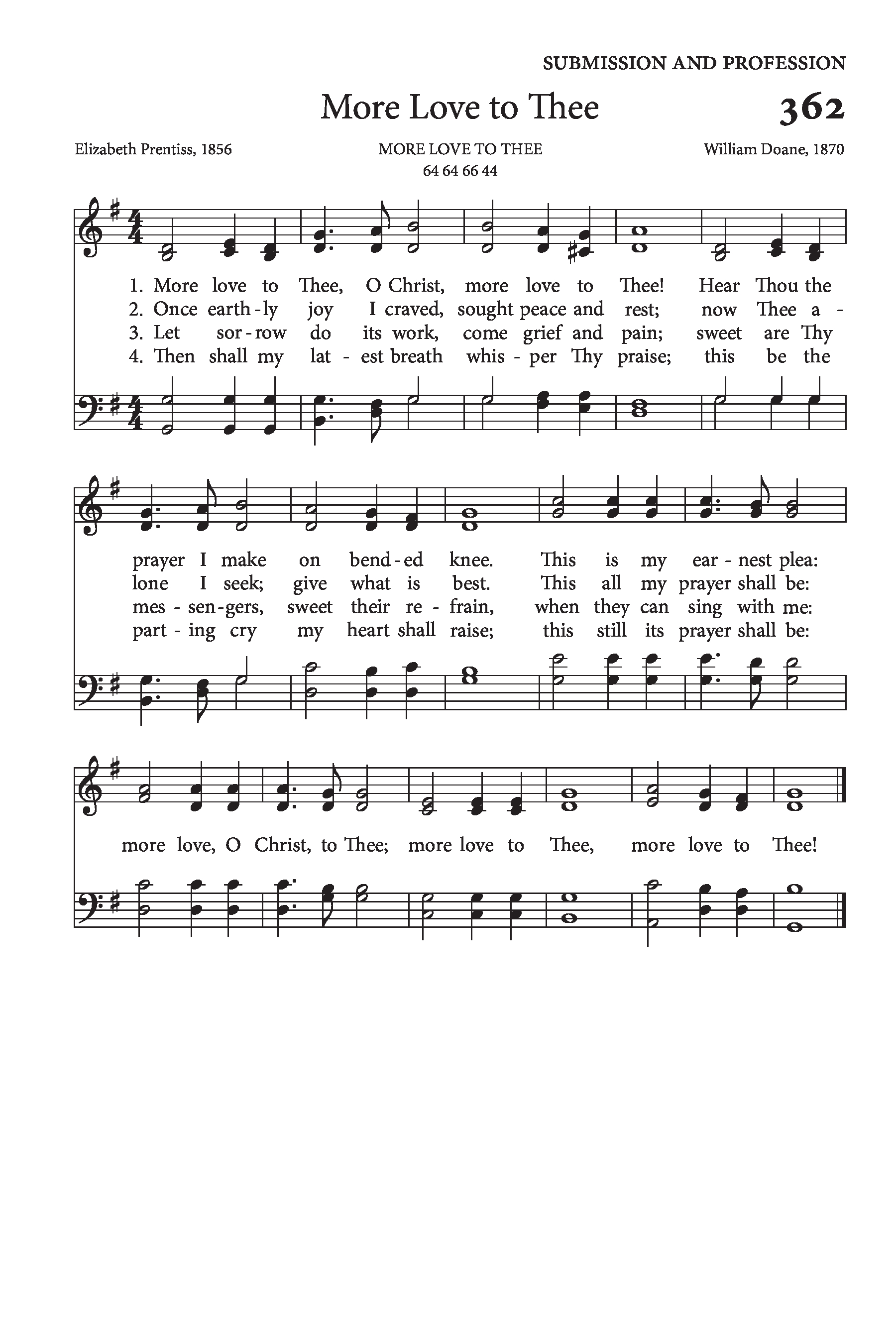More Love to Thee, O Christ
Lyrics
More love to Thee!
Hear Thou the prayer I make
On bended knee;
This is my earnest plea:
More love, O Christ, to Thee,
More love to Thee,
More love to Thee!
Sought peace and rest;
Now Thee alone I seek,
Give what is best;
This all my prayer shall be:
More love, O Christ, to Thee,
More love to Thee,
More love to Thee!
Whisper Thy praise;
This be the parting cry
My heart shall raise;
This still its prayer shall be:
More love, O Christ, to Thee,
More love to Thee,
More love to Thee!
Bible Reference
Mark 12:30
About This Hymn
“More Love to Thee, O Christ” is a deeply personal and spiritually rich hymn written by Elizabeth Payson Prentiss, an American author and devout Christian woman whose life was marked by profound sorrow and enduring faith. Composed in 1856 but not published until 1869, this hymn expresses the soul’s earnest desire for deeper love and devotion to the Lord Jesus Christ, especially in times of grief. It was born from personal suffering and spiritual longing, making its simple words powerful in their sincerity.
Elizabeth Prentiss was the wife of a Presbyterian pastor and is best known for her novel Stepping Heavenward, which, like her hymn, reflects her strong devotional life. Her experience of losing two young children in quick succession brought her into a season of great sorrow. From that sorrow came this heartfelt prayer, written privately in her diary. It was not meant for publication but rather as a quiet expression of her desire to love Christ more fully, especially when earthly joys had faded.
The hymn opens with a direct appeal: “More love to Thee, O Christ, more love to Thee!” This repeated line anchors each stanza and reveals the single, burning passion of the soul — not merely relief from suffering, nor material blessings, but a heart wholly devoted to Jesus. The first verse sets the tone with a recognition that while once the soul may have longed for earthly joy and peace, now the only true desire is love for Christ.
In the second stanza, the hymn continues by acknowledging the heart's previous prayers for rest and joy. But now, through trial, the soul has discovered a higher pursuit. Even pain has become a means of sanctification, shaping the heart to say, “Thou, alone, O Christ, art all I need.” The believer’s prayer has matured from temporal comfort to eternal communion. It is a reflection of Job 23:10 — “But he knoweth the way that I take: when he hath tried me, I shall come forth as gold.”
The third verse invites the world to bear witness to this inner transformation: “Let sorrow do its work, send grief or pain.” There is a submission here, even to suffering, if it leads to greater love for Christ. The soul is no longer resisting God's providence but embracing it as a tool to draw nearer to the Savior. This echoes Philippians 3:10, where Paul writes of knowing Christ through “the fellowship of his sufferings.”
The final verse is a prayer for one final offering — that the life and breath of the believer may be filled with the song of loving Christ above all else. The “whisper” of the heart becomes a lifelong testimony: more love to Christ is the believer’s greatest desire, highest ambition, and final joy.
Musically, the hymn has been paired with several tunes, but the most enduring melody was composed by William H. Doane, who gave the text its musical voice in 1870. The tune is reverent and gentle, matching the reflective and prayerful tone of the lyrics. Its singable simplicity has made it a favorite for devotional services, quiet reflection, and memorial occasions.
“More Love to Thee, O Christ” is not a triumphant anthem, but a tender and humble plea — a spiritual aspiration that rises from the ashes of loss. Its enduring power lies in its honesty and spiritual focus. It offers no grand theological exposition, but it embodies the heart of the Christian life: to love Christ more deeply, no matter the cost. In joy or sorrow, in gain or loss, the soul that prays this hymn is pressing closer to the Savior, seeking to echo the words of Peter: “Lord, thou knowest that I love thee” (John 21:17).


📬 Subscribe to Our Devotional Updates
Receive weekly hymns, devotionals, and website features directly in your inbox.
Hymn Information

- Category: Hymn
- Author/Writer: Elizabeth Prentiss (1856)
- Added: July 25, 2025
- Last Updated: July 25, 2025
- Views: 872
To view the author's biography, click their name above.
MIDI File
Popular Hymns
Recent Blog Posts
Popular Blog Posts
Visit Us on Social Media
Latest from X (Twitter)
Tweets by HymnalLibraryLatest from Facebook
Latest on YouTube
Daily Bible Verse
Disclaimer
The hymns, sheet music, MIDI files, and related content on this website are provided for educational and research purposes only.
- Public Domain: Many of the hymns featured here are in the public domain and may be freely used.
- Copyrighted Works: Some hymns may still be under copyright protection. Where applicable, permission has either been requested from the copyright owner, or the content is shared under the principles of fair use for educational purposes.
⚠️ Important Notice: If you wish to reproduce, distribute, or use any copyrighted hymn beyond personal study or educational use, you must obtain permission directly from the copyright holder. This website does not grant any rights for commercial use yet.
If there is any other question please address it to us in our Contact Page, for further assistance. Thank you for using the site. May God Bless You.













